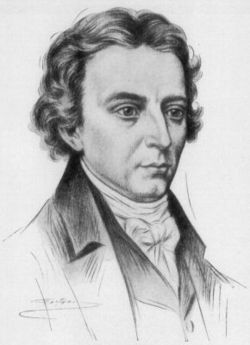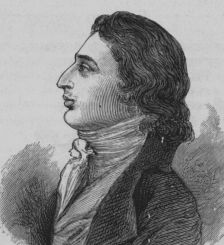Difference between revisions of "Robert Southey" - New World Encyclopedia
Nathan Cohen (talk | contribs) (Imported) |
Nathan Cohen (talk | contribs) (First paragraphs) |
||
| Line 1: | Line 1: | ||
[[Image:Robert Southey - Project Gutenberg eText 13619.jpg|thumbnail|right|250px|'''Robert Southey''', English poet]] | [[Image:Robert Southey - Project Gutenberg eText 13619.jpg|thumbnail|right|250px|'''Robert Southey''', English poet]] | ||
| − | '''Robert Southey''' ( | + | '''Robert Southey''' (August 12, 1774 – March 21, 1843) was an [[England|English]] poet and writer of the Romantic school. Southey was intimately linked to all the major figures of English Romantic poetry; he was a close friend and neighbor of [[William Wordsworth|Wordsworth]]; he attended college with [[Samuel Taylor Coleridge|Coleridge]] and the two spent many of their most fruitful years living under the same roof. Ironically, however, for a man so intimately connected to poetic developments in England, Southey never achieved major success as a poet. Although he wrote a number of poems which critics consider very succesful, and although he was most certainly talented, Southey's poetry suffered from excessive mythologizing and allusion, at the expense of poetic clarity. |
| + | |||
| + | Ironically, Southey's fame now rests not on his poetry but on his prose. Although many of Southey's contemporaries (including, eventually, Coleridge) would voice their doubts about his talents as a poet, Southey's genius for prose-writing was never questioned even by his bitterest critics. Being so close to so many important poets and writers of his generation, Southey's prolific prose work and correspondence is an invaluable record for one of the most important eras in English poetry. Moreover, Southey wrote a number of non-fiction books, many of which are still popular today, including biographies of [[Lord Nelson]], [[John Bunyan]], and [[John Wesley]], and a historical study of [[Portugal]] and [[Spain]] where Southey rather famously "thanked God [he was] an Englishman". A master of the essay and an accomplished if not spectacular poet, Southey is an invaluable witness to the historical and literary developments of the early 19th-century who not only recorded the Romantic movement but also played a critical part in it. | ||
==Life== | ==Life== | ||
| − | |||
He was born in [[Bristol]] to [[Thomas Southey]] and [[Margaret Hill]] and educated at [[Westminster School]] (from which he was expelled for writing a magazine article condemning [[flagellation|flogging]]) and [[Balliol College, Oxford]] (of his time at Oxford Southey was later to say "All I learnt was a little swimming ... and a little boating."). After experimenting with a writing partnership with [[Samuel Taylor Coleridge]], he published his first collection of poems in [[1794]]. The same year, he, Coleridge and a few others discussed setting up an idealistic community in America. | He was born in [[Bristol]] to [[Thomas Southey]] and [[Margaret Hill]] and educated at [[Westminster School]] (from which he was expelled for writing a magazine article condemning [[flagellation|flogging]]) and [[Balliol College, Oxford]] (of his time at Oxford Southey was later to say "All I learnt was a little swimming ... and a little boating."). After experimenting with a writing partnership with [[Samuel Taylor Coleridge]], he published his first collection of poems in [[1794]]. The same year, he, Coleridge and a few others discussed setting up an idealistic community in America. | ||
Revision as of 18:55, 19 July 2006
Robert Southey (August 12, 1774 – March 21, 1843) was an English poet and writer of the Romantic school. Southey was intimately linked to all the major figures of English Romantic poetry; he was a close friend and neighbor of Wordsworth; he attended college with Coleridge and the two spent many of their most fruitful years living under the same roof. Ironically, however, for a man so intimately connected to poetic developments in England, Southey never achieved major success as a poet. Although he wrote a number of poems which critics consider very succesful, and although he was most certainly talented, Southey's poetry suffered from excessive mythologizing and allusion, at the expense of poetic clarity.
Ironically, Southey's fame now rests not on his poetry but on his prose. Although many of Southey's contemporaries (including, eventually, Coleridge) would voice their doubts about his talents as a poet, Southey's genius for prose-writing was never questioned even by his bitterest critics. Being so close to so many important poets and writers of his generation, Southey's prolific prose work and correspondence is an invaluable record for one of the most important eras in English poetry. Moreover, Southey wrote a number of non-fiction books, many of which are still popular today, including biographies of Lord Nelson, John Bunyan, and John Wesley, and a historical study of Portugal and Spain where Southey rather famously "thanked God [he was] an Englishman". A master of the essay and an accomplished if not spectacular poet, Southey is an invaluable witness to the historical and literary developments of the early 19th-century who not only recorded the Romantic movement but also played a critical part in it.
Life
He was born in Bristol to Thomas Southey and Margaret Hill and educated at Westminster School (from which he was expelled for writing a magazine article condemning flogging) and Balliol College, Oxford (of his time at Oxford Southey was later to say "All I learnt was a little swimming ... and a little boating."). After experimenting with a writing partnership with Samuel Taylor Coleridge, he published his first collection of poems in 1794. The same year, he, Coleridge and a few others discussed setting up an idealistic community in America.
- Their wants would be simple and natural; their toil need not be such as the slaves of luxury endure; where possessions were held in common, each would work for all; in their cottages the best books would have a place; literature and science, bathed anew in the invigorating stream of life and nature, could not but rise reanimated and purified. Each young man should take to himself a mild and lovely woman for his wife; it would be her part to prepare their innocent food, and tend their hardy and beautiful race.
Later iterations of the plan moved the commune to Wales, but later, Southey was the first of the group to reject the idea as unworkable.
Southey's wife, Edith, was the sister of Coleridge's wife. The Southeys set up home at Greta Hall, Keswick, in the Lake District, living on a tiny income. From 1809, he contributed to the Quarterly Review, and had become so well-known by 1813 that he was appointed Poet Laureate.
In 1819, through a mutual friend (John Rickman), Southey met leading civil engineer Thomas Telford and struck up a strong friendship. From mid-August to 1 October 1819, Southey accompanied Telford on an extensive tour of his engineering projects in the Scottish Highlands, keeping a diary of his observations. This was published posthumously in 1929 as Journal of a tour in Scotland in 1819.
In 1838, Edith died and Southey married Caroline Anne Bowles, also a poet. Many of his poems are still read by British schoolchildren, the best-known being The Inchcape Rock and After Blenheim (possibly one of the earliest anti-war poems).
According to the June 1, 2006 airing of Paul Harvey's The Rest of the Story, Southey "denounced free trade and praised the working man," making him an early example of a socialist or even communist.
Major works
- Fall of Robespierre ( 1794 ).
- Joan of Arc: An Epic Poem ( 1796 )
- Poems ( 1797 - 99 )
- Letters from Spain ( 1797 )
- Devil's Thoughts ( 1799 )
- Thalaba the Destroyer ( 1801 )
- Amadis de Gaula ( 1803 ). Translation
- Madoc ( 1805 )
- Letters from England ( 1807 )
- Palmerin of England ( 1807 ). Translation.
- The Cid ( 1808 ). Translation
- The Curse of Kehama ( 1810 )
- The Life of Nelson ( 1813 )
- Roderick, the Last of the Goths ( 1814 )
- Wat Tyler: A Dramatic Poem ( 1817 )
- Journal of a Tour in Scotland in 1819 ( 1929, posthumous )
- The Life of Wesley, and the rise and progress of Methodism (c.1820)
- A Vision of Judgment ( 1821 )
- Life of Cromwell ( 1821 )
- Thomas More ( 1829 )
- The Pilgrim's Progress with a Life of John Bunyan (1830)
- Cowper ( 1833 )
- The Doctors ( 1834 ). Includes the first published version of the fairy tale-like The Three Bears.
- Select Lives of Cromwell and Bunyan (1846)
- The Inchcape Rock
Wikipedia Links
- Caroline Bowles
- Goldilocks and the Three Bears
- The Three Bears
External links
- Works by Robert Southey. Project Gutenberg
- The original Southey version of The Three Bears
- The Robert Southey Collection: Presented online by The University of Wisconsin Digital Collections Center. Titles include:
- Southey, Robert, 1774-1843. Southey's Common-place book. First series. Choice passages. Collections for English manners and literature: 2d. ed. (1850)
- Southey, Robert, 1774-1843. Southey's Common-place book. Second series. Special collections: 2d. ed. (1850)
- Southey, Robert, 1774-1843. Southey's Common-place book. Third series. Analytical readings: 2d. ed. (1850)
- Haller, William. 1885- The early life of Robert Southey, 1774-1803 (1917)
- Southey, Robert, 1774-1843. The doctor, &c. (1848)
- e-book of Madoc, an epic poem in two volumes about the legendary Welsh prince Madoc.
Credits
New World Encyclopedia writers and editors rewrote and completed the Wikipedia article in accordance with New World Encyclopedia standards. This article abides by terms of the Creative Commons CC-by-sa 3.0 License (CC-by-sa), which may be used and disseminated with proper attribution. Credit is due under the terms of this license that can reference both the New World Encyclopedia contributors and the selfless volunteer contributors of the Wikimedia Foundation. To cite this article click here for a list of acceptable citing formats.The history of earlier contributions by wikipedians is accessible to researchers here:
The history of this article since it was imported to New World Encyclopedia:
Note: Some restrictions may apply to use of individual images which are separately licensed.



